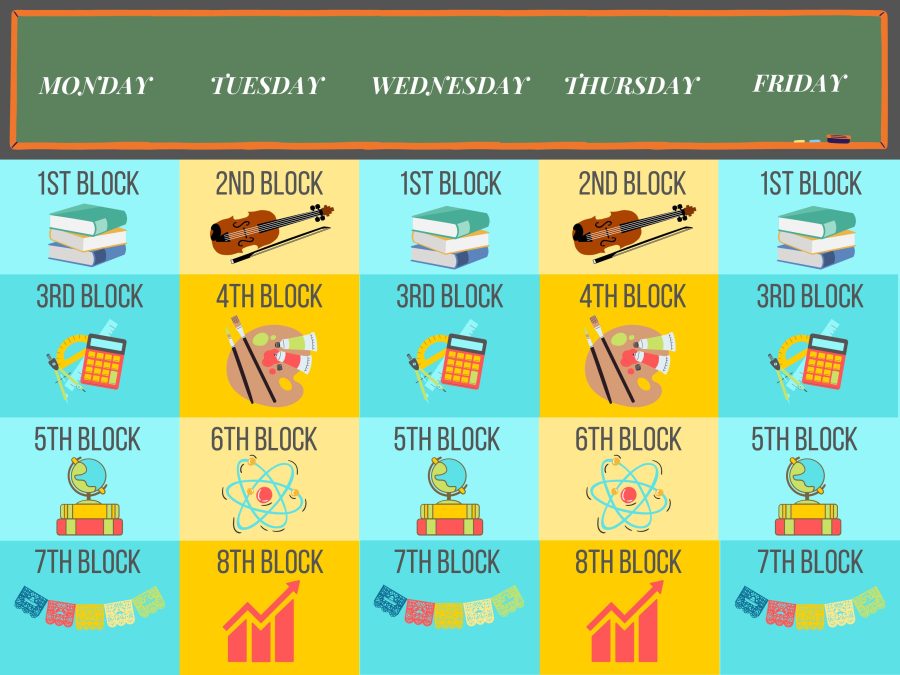Diverging from our traditional eight period school days to our current block schedule was a dramatic shift for both students and teachers at Abington. I found comfort within the short periods I had experienced since middle school. I frequently glanced at the classroom clock with my cheeks resting in my palms, knowing that whatever content session we were having would come to an end soon. When I heard prattling in the air of a new schedule emerging my sophomore year, I dreaded it. Alternating days, no lunch periods, listening to teachers’ voices grow monotone after the first hour, elongated clock glaces that ticked in slow motion; it sounded awful, much less impractical. I remember thinking, “What do you even do in gym class for 90 minutes? Walk in circles like a fish in a bucket for the first 60 minutes and hide in the bathroom for the last 30?” When block scheduling launched my junior year, I was pleasantly surprised by its benefits. The limited, focused weekly content absorption led to easier long-term memory. Less information was being thrown at us and more of it was sticking. The bulk of my classes still assigned the same amount of homework as before, except I had an extra night to do it; sometimes three to four nights if assigned on a Thursday or Friday. I now had an extra half hour to take tests (aside from teachers that snagged tests early to “mimic the AP exam”), which for me, was a slow test-taker’s dream. Classes that benefit from extended periods, like science, were now thriving because they had a time for sitting and learning, and a time for interactive lab work in a relaxed environment that was neither rushed or dull, which I particularly enjoyed. Late arrival and early release, both of which I had at some point in time, permitted me to sleep in till 9:00 AM and leave school at 1:06 PM feeling like I still had the whole day ahead of me; all I had to do was get through three long class periods, which I could handle since I became acclimated to them after the first couple months.
As thrilling as this all sounds, block scheduling isn’t functional enough to be implemented as the new and improved structure of high school. Each reason why I’ve grown to love block scheduling has its congruent drawback. Early releases are a blessing for upperclassmen, however I believe them to be short lived. Students who leave early school hours early often feel unmotivated. A greater apparent problem is the substantial loss of absences. With block scheduling, a student who misses one class period for a sports game may only go to a particular class one time that week. Friends of mine who have come down with a sickening stomach bug and had to take a couple days off school take weeks to feel caught up in their classes. Students that miss a lesson have to teach themselves a larger margin of content and retain an information overload with negligible help. This is not attainable for highschoolers and too hurtful to be standard. Additionally, teenagers’ attention spans are short and they’re only getting shorter. The majority can only focus for 40 to 50 minutes. While class with less content absorption guides students to focus on learning material, they likely only tune in for the first half of class and don’t retain the developed intricacies of subjects. If students primarily benefit from the beginning of a block (the equivalent of a traditional class period), then having prolonged class periods 2-3 times a week is digressive and futile. A regular schedule is more concise and compels students to reinforce content every day. And while I love holidays and snow days, they only further contribute to the loose grasp of context and forgetfulness that inadvertently arise from blocking.
Teachers and education administrators realized there were issues within the traditional high school agenda, which is why they resorted to block scheduling in an attempt to redraft. Blocking is efficient for some teachers for a plethora of situational factors as well as students, like me, however, this is not enough to make it customary. A great deal of changes occurred in Abington the last few years. With the numerous schedule alterations, adding ninth graders, and lunch muddle, my teachers and peers have been the school system’s guinea pigs for quite some time. Though galling for everyone involved, each gradual and abrupt change represents a step closer to a near-perfect schooling composition. Recognizing and amending the defects of block scheduling will advance this development. I think, for example, a good way to devise early release would be to only allow seniors to obtain it and require them to maintain a B average. In life, all things can be revised for the enhancement of our flawed society. The key to fixing the school system is by approaching it incrementally and being compromising within the thoughtful trial-and-error process that will naturally brew, and taking all viewpoints into consideration.








